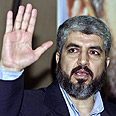Profiles in Terror
The BBC profiles Mahmoud Zahhar, leader of Hamas in Gaza, and one of its original founders along with Sheik Yassin and Abdel-Aziz Rantisi in 1987. He, himself, started his ideological "career" in the Gaza branch of Egypt's Muslim Brotherhood.
Both YNET and Debka appear to be in accord that talks are going on right now to return Syria-based Hamas leader Khaled Mashaal to Palestinian territories.

Palestinian sources have told Ynet that 'serious contacts' are taking place between the Hamas leadership, top PA officials, and European representatives, as part of an attempt to bring Hamas leader Khaled Mashaal to the Palestinian territories.
Palestinian sources have said that as soon as the results are confirmed, Hamas, the EU, and Egypt will examine possibilities for returning Mashaal to the Palestinian territories. Those who support the move say Mashaal's return would significantly moderate Hamas, and disconnect it from Syrian and Iranian pressures, leading to much greater cooperation between Hamas and other elements in the PA.
The sources say that Mashaal would work for a long ceasefire (hudna), which would last for approximately 10 – 15 years, and which will guarantee real calm in the area.
Well, consider the "sources."
Sounds "very reliable." That's, no doubt, why this guy has been stationed in Syria the whole time. Because of his "moderating" influence.
Debka characterizes Mashaal rather differently, as "the real power behind Hamas, the radical Khaled Mashaal."
Apparently the plan at the moment is to position non-Hamas members as prime minister and minister of finance - in order to begin to gain outside acceptance to pressure Israel.
With outside figures in the posts of Palestinian prime minister and finance minister, Israel may see the Hamas-dominated administration gaining international acceptance. Jerusalem's non-recognition posture would then come under pressure. Abbas will no doubt explain to the Americans that the Palestinian situation is no different from that of Lebanon, whose government is not blacklisted despite Hizballah’s participation.
In other cockle-warming developments, Colombia broke up a false passport ring with ties to al Qaeda and Hamas.
The gang allegedly supplied an unknown number of citizens from Pakistan, Jordan, Iraq, Egypt and other countries with false passports and Colombian nationality without them ever stepping foot in the country, the attorney general's office said in a written statement.
The counterfeited passports were then used to facilitate their entry into the United States and Europe...
"We confirm that some of the arrestees are wanted for extradition for collaborating with terrorist groups al-Qaida and Hamas," Otalora told RCN television.
Four were Jordanian citizens were among those arrested, said Manuel Saenz, head of foreign immigration for the DAS secret police, on Caracol television. And eight are being sought by the United States for extradition, Otalora said.
The group apparently penetrated Colombia's federal bureaucracy and secret police. Three DAS officials and an employee of the national registry were among the arrested...
U.S. officials have long feared al-Qaida could take advantage of corrupt government officials and weak institutions to launch an attack from south of the border.
Much of the focus in South America, however, has fallen on the large Muslim community in Paraguay along the porous border with Argentina and Brazil.
Authorities believe as much as $100 million a year flows out of the region, with large portions diverted to Islamic militants linked to Hezbollah and Hamas.
A little more Who's Who in Hamas, a nicely alliterative phrase.







0 Comments:
Post a Comment
<< Home